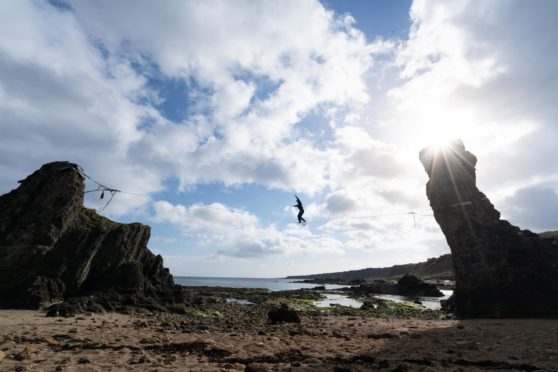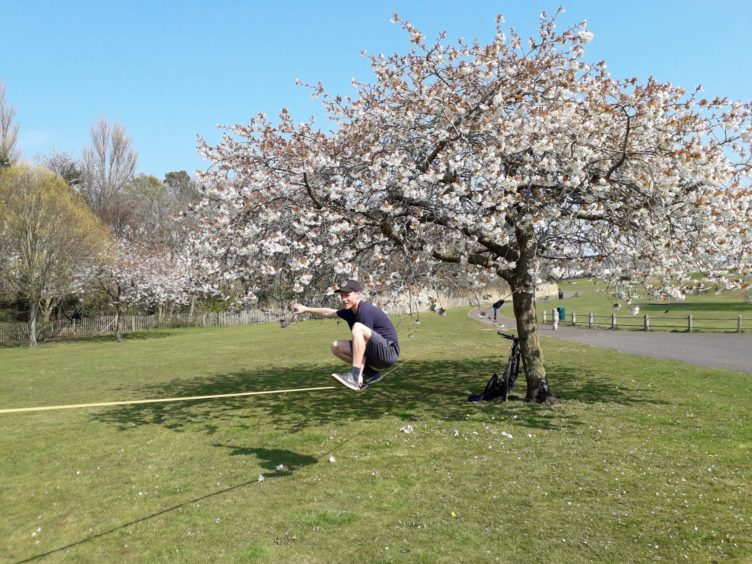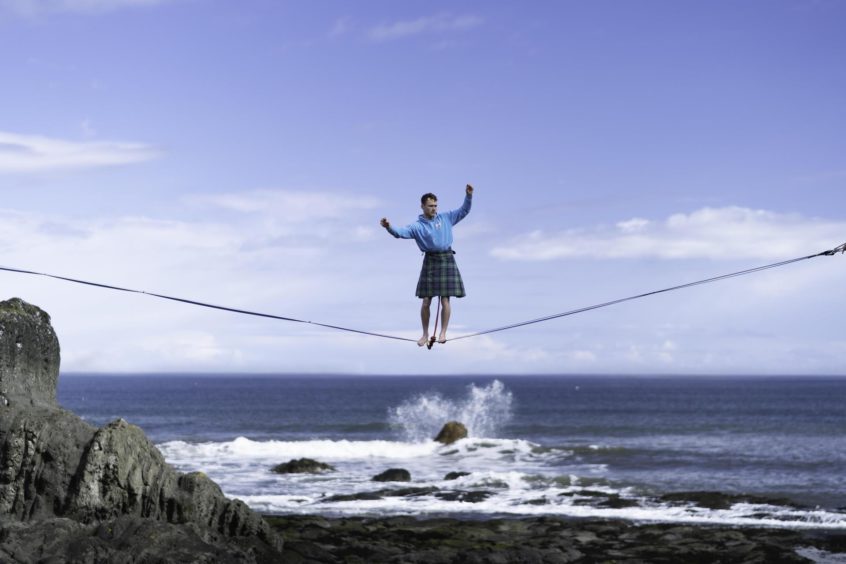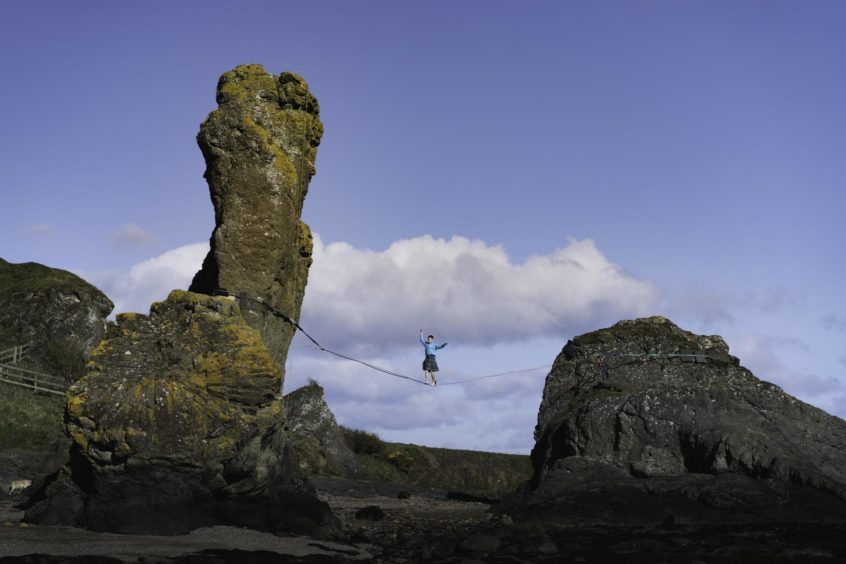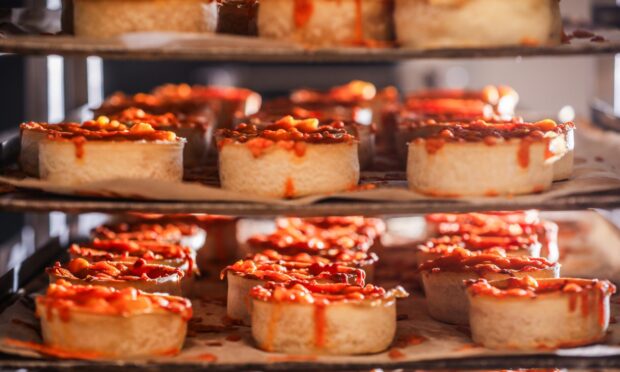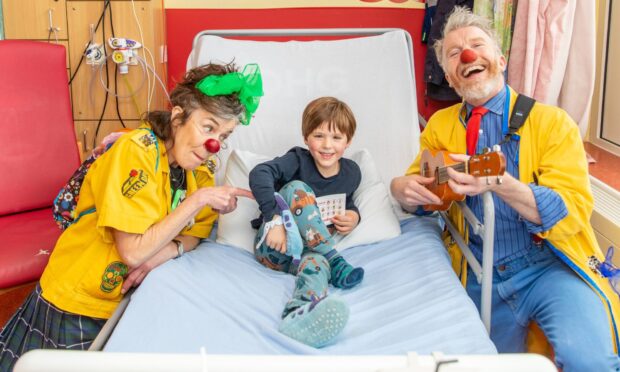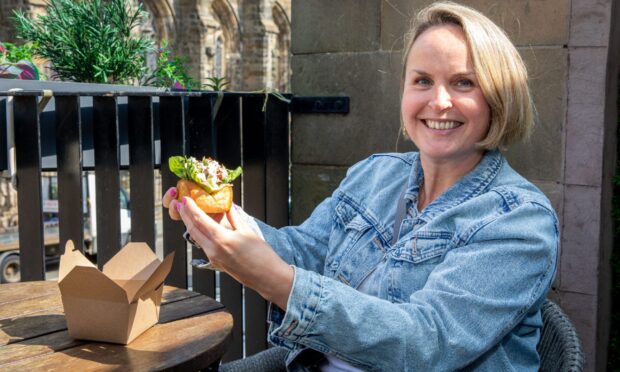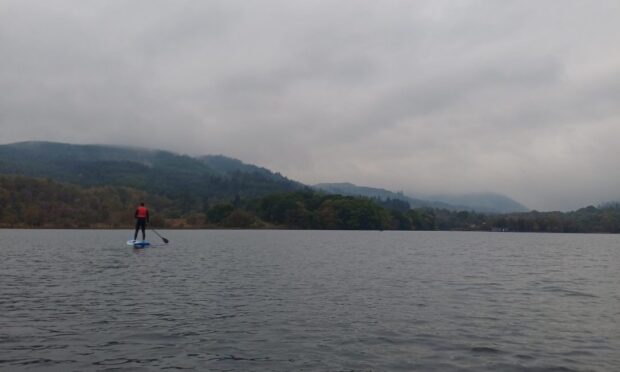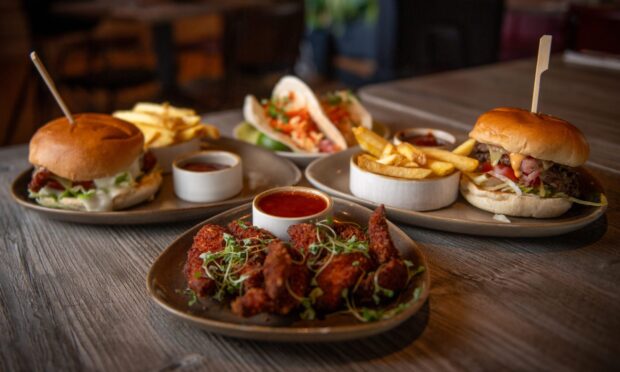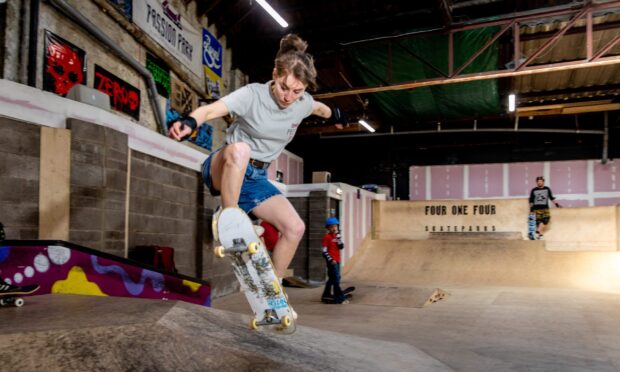Spending your lunch hour in a sunny park is a great way to get a break from study. For Owen Hope, who is in his third year at St Andrews University, simply sitting and relaxing in the sun isn’t an option, though.
He has set up a slackline – a length of flat webbing that is fixed to two anchors but not stretched tight – for a practice session in preparation for his own take on this year’s Kiltwalk, which is taking place in virtual form all over the country this weekend.
Owen won’t be walking for miles and miles – just 30 metres is his target – but the fact that he will be suspended about 20m up between the Rock and Spindle rock formations near St Andrews will make those 30m pretty challenging!
Having been introduced to climbing by his father when he was a child, the 21-year-old is no stranger to the care and specialised equipment needed for adventurous sports. He got interesting in slacklining when he was “bored during the first lockdown” after he had moved back home to Lochardil near Inverness.
“I bought a slackline and rigged it up between two trees,” he explains, while casually hopping up on to the line he has suspended between two blossoming cherry trees.
“You start with a short line and probably only two feet off the ground and gradually learn to increase the length and height of the line.”
Unlike a tightrope, a slackline has a lot of give and the looser it is rigged the more it moves. As a result, where a tightrope walker moves in a very rigid manner, slackliners have a much more fluid technique, often using their arms and free leg to make adjustments to help keep their balance.
Chatting to Owen, it is obvious that he isn’t a young man who does things by half. In non-Covid times, the undergraduate works part-time in a local pub and also for the charity with which he first volunteered as part of his Duke of Edinburgh Award – SNAP in Inverness. He also manages to find time to volunteer with adventure play service The Yard in Dundee.
He showed the same dedication to learning to slackline: “I was able to kill five hours a day – it was so fun, I had such a good time. It kept me fit and well.”
So, in the space of a year, Owen has gone from balancing on a line a few feet from the ground to experimenting with much higher walks, referred to as “highlining”.
The main difference is that it will hurt a lot more if you fall, and so highliners use a safety harness and spend a lot of time and effort safely designing and rigging their lines with minute attention to detail. If you do fall the equipment is designed to absorb shock. It has enough stretch so that if you fall it doesn’t jolt but it will catch you.
“A lot of climbers reckon they can jump on a highline,” he says, “but you need very different skills with the rigging and the approach. With highlining you rely exclusively on your gear – there isn’t a wall or rock face to hold on to. I don’t tolerate any imperfection in my set-up. You can always highline another weekend.”
With this amount of faith in the integrity of your equipment and your own ability, it is easy to understand why Owen can say: “Nothing about it is dangerous.”
He modestly downplays the dedication (and bravery) required to train for a highline challenge and points out that, done properly, “the most dangerous thing about the challenge is driving there”.
Even so, it takes a certain amount of self-possession to walk along what is ostensibly a flat piece of rope suspended high above a craggy rock formation. Perhaps even more so to do it while wearing a kilt!
For Owen, slack and highlining bring a host of physical and mental benefits, not least because he has discovered something that he truly loves to do.
“This sport really strengthens in very subtle ways,” he says. “Your torso should stay quite straight but you keep the ability to move in a very fluid way, especially your arms. It’s also really good for your posture – the core is always engaged.”
Owen played basketball to a high level until he was 16, resulting in some problems with his knees. He says that the slacklining has helped to strengthen the muscles and there is a growing trend for using slackline practice to help prevent and rehabilitate lower leg injuries.
He also points out that continued practice helps “the rate at which your brain can communicate to your muscles. My brain subconsciously knows that I have to make a movement or adjustment”.
To onlookers, Owen might look relaxed as he walks along the slackline but he says that it isn’t really a calming pastime. “Not in an ‘at-one-with-nature’ way,” he laughs. “I get really pumped up to do it but slow breathing is really useful. I love the little bits of stress. I like the sense of feeling small – that the world doesn’t care about you.”
While the sport may look daunting or inaccessible to most, he insists that it’s like anything, where you start small and build up the skills. “I’m not super talented, I progressed like you do in any other sport – it becomes comfortable to move on the line. You learn to master it and gradually increase the length and height.”
Owen first thought of using his sport to raise money when he noticed that people were really interested in what he was doing when he was out and about, practising either on his slackline or setting up the more involved highline.
“I was so aware of the sheer volume of people who would stop to chat to me because I was doing something unusual. I think people want to see something different.”
Owen thought he could translate that interest into raising funds and awareness for a charity challenge, and decided to use the virtual Kiltwalk as a platform to raise funds for the charity closest to his heart.
“I have worked with SNAP since I was 14, as a volunteer and then an employee,” he says.
SNAP is a lifeline for people and families living with additional support needs. It offers a safe space for children and adults to make friends and socialise, try new activities in a supportive environment and give parents, carers and siblings a break.
“I’ve seen kids who I worked with grow up. Some of them have intense medical or behavioural needs,” says Owen.
Like many support charities, SNAP had to close its doors completely during the first period of lockdown in March last year. “Families were left with no support,” he recalls. “I worked with others on the Wellbeing project which meant that we could try to keep those connections going.”
Find out more about Owen’s fundraising efforts and highlining here: or on Instagram.
